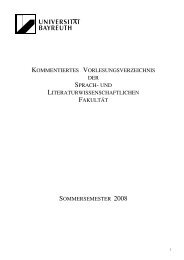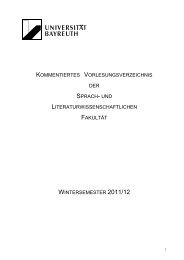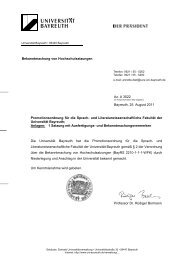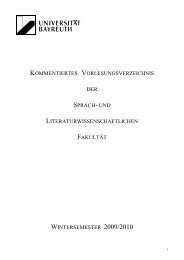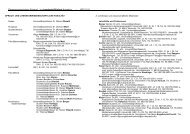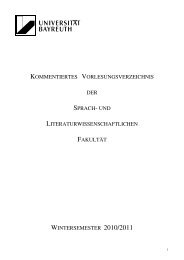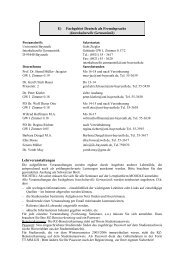Kommentiertes Vorlesungsverzeichnis Sommersemester 2013
Kommentiertes Vorlesungsverzeichnis Sommersemester 2013
Kommentiertes Vorlesungsverzeichnis Sommersemester 2013
Sie wollen auch ein ePaper? Erhöhen Sie die Reichweite Ihrer Titel.
YUMPU macht aus Druck-PDFs automatisch weboptimierte ePaper, die Google liebt.
This course introduces students to the research methods and writing skills relevant for writing an MA thesis in American<br />
Studies and provides a platform for presenting their work in progress.<br />
Please contact the instructor directly if you would like to participate in this course. jeanne.cortiel@unibayreuth.de.<br />
41133 “Literary Critical Theory and Practice: Kate Chopin, The Awakening”<br />
MAIAS A 3; Special Seminar Theories and Methods<br />
Mayer<br />
HS, 2st., Do 10-12,<br />
This seminar has a double purpose. It aims at introducing students to a classic of late-19th century American literature,<br />
Kate Chopin's The Awakening (1899), and to several literary critical approaches, among them narratological<br />
criticism, feminist criticism, and new historicism. Set in late-19th century Louisiana’s Creole culture, The Awakening<br />
addresses the complexities of a woman’s struggle to chart her own life. The novel traces the life of Edna Pontellier,<br />
an upper-class wife and mother who tries to escape her dull domestic routines and rebels against confining personal,<br />
social, and cultural forces. The rich language of The Awakening, its vivid and sensuous imagery, its provocative<br />
ending, its traces of realism, naturalism, and impressionism have sparked an immense critical interest since the<br />
novel’s re-discovery in the 1970s. Participants should use the edition of The Awakening given below and are expected<br />
to have read the novel by the beginning of the teaching period.<br />
Students interested in participating must register via e-mail to amanee.katwaroo@uni-bayreuth.de by April 1,<br />
<strong>2013</strong>.<br />
Text: Kate Chopin. The Awakening. Ed. Nancy A. Walker. Case Studies in Contemporary Criticism. Boston: Bedford/St.Martin,<br />
2000. ISBN-13: 978-0312195755<br />
41134 MAIAS Research Seminar<br />
MAIAS C 4<br />
OS, 2st., Do, 8-10<br />
68<br />
Mayer<br />
This seminar gives students of literary and cultural studies the opportunity to discuss their research projects. Particular<br />
attention will be paid to the use of theoretical concepts and their methodological application central to the<br />
projects, but also to techniques of argumentation and written presentation. The first meetings of the seminar will<br />
deal with issues of theory, method, and academic research in general. The following meetings will address the participants’<br />
individual fields and topics of interest. Participants will have to present work-in-progress – either an MA<br />
thesis project that is already under way or work on topics that will be part of the oral or written MAIAS exams.<br />
Students interested in participating in the seminar have to register via e-mail to sylvia.mayer@unibayreuth.de<br />
by April 1, <strong>2013</strong>.<br />
MAIAS Linguistics<br />
41165 Colloquium on Methods: Linguistic Fieldwork Methods MAIAS (C3), Anchimbe<br />
MA SprInK<br />
HS 2st., Mon 12-14,<br />
Collecting authentic data on which reliable findings could be made is central to linguistics, especially in the last decade<br />
where corpus linguistic approaches became preferred. This advanced course will be concerned with techniques<br />
in fieldwork research and is meant to be significantly more practical than theoretical. Participants will be expected to<br />
apply some of the major fieldwork techniques either to their own research projects or to other projects. Issues of<br />
interest will include designing and administering questionnaires, conducting interviews, doing participantobservation,<br />
doing electronic recording, transcribing recorded data, and choosing quantification methods.<br />
Reading: Duranti, Alessandro. 1997. Linguistic Anthropology. Cambridge: Cambridge University Press.<br />
41166 English(es) in Australia and South Africa<br />
MAIAS (A1.1, A2), MA SprInK<br />
HS 2st., Di 12-14,<br />
Bieswanger<br />
This course will explore and compare the status, function and features of English(es) in Australia and South Africa.<br />
We will look at the historical development, current functions and uses as well as linguistic features of different varieties<br />
of English spoken in Australia and South Africa. The analysis of these issues will be connected to the discussion<br />
of theoretical concepts from areas such as language contact, multilingualism, and language policy. We will also<br />
identify and compare the main linguistic characteristics of these varieties with the help of available literature, linguistic<br />
corpora, authentic texts, recordings and audiovisual material.<br />
Students interested in participating in this course have to register via e-mail to bieswanger@uni-bayreuth.de<br />
by April 12, <strong>2013</strong>.<br />
41170 Linguistic Approaches to Translation and Culture: Theory and Methods<br />
MAIAS (A 3), MA SprInK<br />
HS 2st., Di 14-16,<br />
Mühleisen<br />
A rather simple and straightforward notion of translation is "to change (speech or writing) from one language into<br />
another". But what exactly does this act of translation involve Rather than just considering lexical and grammatical<br />
equivalence, there are many semantic, pragmatic, text linguistic and language philosophical questions which have<br />
to be taken into account in the process of translation. Every act of translation is also an act of intercultural<br />
communication which requires a reflection on different cultural knowledge and genre norms between source and<br />
target audience. This course will focus on different methods and theories of how to deal with this "Babel tower" –<br />
both from a diachronic and a synchronic perspective. We will then integrate our theoretical and methodological



